

How iPads are damaging our children's health. A report shows 45 per cent of children aged eight surpass the recommended two hours of screen time each day80 per cent of 15 to 16 year olds also spend more than two hours every dayA national survey of Australian schools also found 27 per cent have implemented the Bring Your Own Device program in classroomsThis means primary and high school students are using their own electronic devices at schools as part of their education The health department recommends children older than two years should limit their screen time to less than two hours per dayOne expert says devices will only be an effective learning tool if teachers are properly trained By Sally Lee for Daily Mail Australia Published: 02:51 GMT, 4 February 2015 | Updated: 09:19 GMT, 4 February 2015 Touch screen devices may soon become the norm in classrooms as schools are increasingly moving away from traditional learning methods by using tablets instead. 'If devices are used appropriately it can really enhance children's learning.
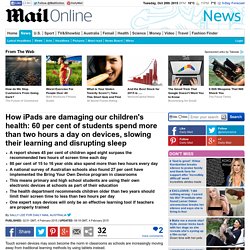
Positive And Negative Impact Of Technology On Children - My Essay Point. Today’s modern life is surrounded with tech products.
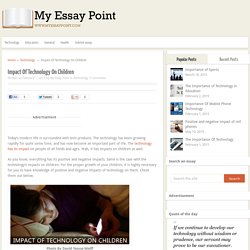
The technology has been growing rapidly for quite some time, and has now become an important part of life. The technology has its impact on people of all fields and ages. Yeah, it has impacts on children as well. As you know, everything has its positive and negative impacts. Same is the case with the technology’s impacts on children. Positive And Negative Impact Of Electronic Devices And Gadget to The … Tablets and smartphones may affect social and emotional development, scientists speculate.
Using a smartphone or iPad to pacify a toddler may impede their ability to learn self-regulation, according to researchers.
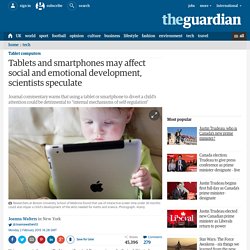
In a commentary for the journal Pediatrics, researchers at Boston University School of Medicine reviewed available types of interactive media and raised “important questions regarding their use as educational tools”, according to a news release. The researchers said that though the adverse effects of television and video on very small children was well understood, society’s understanding of the impact of mobile devices on the pre-school brain has been outpaced by how much children are already using them. The researchers warned that using a tablet or smartphone to divert a child’s attention could be detrimental to “their social-emotional development”.
“If these devices become the predominant method to calm and distract young children, will they be able to develop their own internal mechanisms of self-regulation?” The scientists asked. Screen Time Isn't Always Bad for Kids. Most parents know the importance of reading to their children.
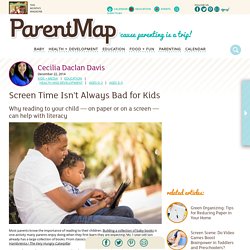
Building a collection of baby books is one activity many parents enjoy doing when they first learn they are expecting. My 1-year-old son already has a large collection of books. From classics like Corduroy to bilingual books like La Oruga Muy Hambrienta / The Very Hungry Caterpillar. The significance of reading to kids, especially infants, was underscored recently when the American Academy of Pediatrics (AAP) released a new policy statement recommending pediatric providers promote reading to children from infancy until at least kindergarten. The policy advises that parents should be encouraged to read aloud to their young children as it can enhance parent-child relationships and help kids learn language and early literacy skills.
Parents are often told to regulate their children’s exposure to screen time when it comes to playing video games or watching television. According to Dr. Should Preschoolers Use an iPad? Many very young children use mobile devices these days, and little is known about their effects.
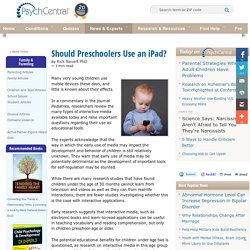
In a commentary in the journal Pediatrics, researchers review the many types of interactive media available today and raise important questions regarding their use as educational tools. The experts acknowledge that the way in which the early use of media may impact the development and behavior of children is still relatively unknown. They warn that early use of media may be potentially detrimental as the development of important tools for self-regulation may be stunted.
While there are many research studies that have found children under the age of 30 months cannot learn from television and videos as well as they can from real-life interactions, there are fewer studies investigating whether this is the case with interactive applications. “It has been well-studied that increased television time decreases a child’s development of language and social skills.